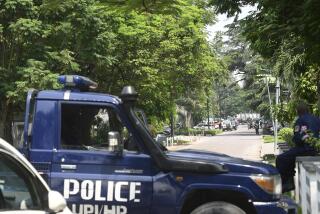Aftermath of Santee School Shootings Becomes a Testing Time for Counselors
All day long, the question lurked in Nancy North’s mind.
There it was at 8 a.m., as the sun peeked over the scrubby green hills and she parked her car outside Santana High School, where two days earlier a student had shot two classmates to death.
The question popped up again that afternoon as she told sobbing 15-year-olds that, yes, it was normal to lie awake in bed, flashing back to bullets ricocheting off classroom doors. It was OK to cry and cry and cry.
This was her question: “How could I ever even begin to help them get over this?”
North was not the only one wondering. The question confronted more than 200 therapists--many of them, like North, volunteers--who streamed into Santee from across the country the day after Charles “Andy” Williams came to school with a gun in his yellow backpack.
The question is also being asked by mental health experts nationwide, some of whom say the influx of counselors after disasters is useless, a ritual gesture emblematic of a therapeutic culture.
“Sometimes grief counselors do more harm than good,” said Sally Satel, a Washington, D.C., psychiatrist and a fellow at the American Enterprise Institute.
Satel, who published articles blasting the “grief industry” after the Columbine school massacre, said that for some students, talking about painful experiences can make things worse. But much research shows that early intervention after a trauma can prevent or lessen the severity of post-traumatic stress disorder.
So in Santee, the aim was to get students talking to each other as soon as possible. The response by therapists was unusually quick, partly because the Grossmont Union School District had updated its crisis plan just six weeks earlier.
Counselors used an intervention method developed for firefighters who witness unspeakable horrors. The first week after the March 5 killings, there was one therapist for every 10 students, a counselor in every classroom, and others stationed outside the boy’s bathroom where the shooting started.
Guidance counselors pored over student files, tagging those of the ones who had attempted suicide. Those who have had substance abuse problems remain on close watch. District officials even had a portable classroom towed onto campus, where students could go for extra help. About 35 counselors remain on campus.
“It’s like a mental health MASH unit,” said David Moore, a San Diego psychologist. “For 95% of the people who were there, it will be the most traumatic experience they will have in their lifetime. . . . We don’t even pretend that these kids and their families will ever return to what is normal.”
So students were gathered into groups and presented a series of questions: How did you feel when you knew someone was hurt or even killed? What did you do? How has your life changed?
The counselors hoped that by answering these questions, students would build a “therapeutic community” and learn to rely on each other as they grieved.
At first, such questions seemed “silly” to Misty Bonds, who attended the sessions on her first day back at school.
The 16-year-old junior had a backpack full of CDs that had been cracked by bullets. Nightmares propelled her into her mother’s bed in the wee hours of almost every new day. Her first afternoon back at school, she called her mother in a panic after students learned of e-mail threats to finish what Williams allegedly had started.
How, Bonds wondered, could questions like “Where were you when the shots rang out?” possibly make her feel better?
But six days later, after yet another nightmare and a morning spent curled up on her mother’s pillows watching cartoons and eating pizza, Bonds had decided that, maybe, the counseling at school was making things easier. “Groups don’t usually talk to each other,” she said. But now they were.
The counselors have come from all over, including the Red Cross, the San Diego County departments of education and mental health, and the U.S. Department of Education. Counselors in private practice answered urgent pages or, like Nancy North, called and volunteered. Some flew into town, but most live near San Diego.
Before counselors were allowed to see any students, district officials evaluated their credentials. You can’t be too careful, said Loretta Middleton of the San Diego County Office of Education.
After another school shooting a few years ago, a Tarot card reader showed up and offered her services, said Cheri Lovre, a nationally recognized trauma expert.
Across their lapels, right below their name tags, the counselors affixed bright shiny dots, connoting their specialties so panicked teenagers could find someone suited to their needs.
And within a day, the therapists, like the athletes and the cheerleaders, had formed their own campus clique: “We’re the dot people,” said Moore, who gave up two weeks of income from his private practice to volunteer in Santee.
In every corner of the campus, the therapists found themselves tested--and rewarded--as they rarely are in private practice.
They encountered every symptom of traumatic stress they could imagine. Some students are beating themselves up because they didn’t grab the gun from Williams’ hand, Moore said.
Others, friends of Williams, are torn with confusion and guilt. Some refuse to talk about it, staying in their bedrooms.
For some students, the shooting ripped open holes, allowing past traumas to come flooding back in.
There was the boy who had scooped up a fellow student as the bullets flew, helping his bleeding friend to safety.
But now he was haunted, not just reliving the gunfire, but also a beating as a child. The two incidents had linked in his head, forming a traumatic prison he could not escape.
And then there was the student, once a user of marijuana and methamphetamine, who had successfully completed a drug treatment course. Now, for the first time in two years, he was feeling urges to use.
Without hesitation, Moore opened his own wallet and drew out a coin, given to him to commemorate 19 years of his own sobriety. He pressed it into the boy’s palm.
The student’s insistence that his therapists could never understand him melted, Moore said. The boy put the coin in his bag, next to his own talismans marking the first and second anniversaries of sobriety. To Moore’s knowledge, the boy has stayed off drugs.
“It made me feel wonderful,” Moore said. “I’ve been working with kids and trauma for 20 years. This was like nothing I’ve ever seen before.”
Most of the families will never see a bill for all this therapy.
For the first, intense, week, various agencies lent staff counselors.
Now the U.S. Department of Education has offered grant money to keep therapists on campus, and families can also apply for as much as $10,000 in state funds from the Victim Witness program for private counseling. For many therapists in Santee, the idea of payment was as obscene as the bullets ripping across school hallways.
“It’s a crisis, and the community needs to come together,” said North, who saw patients in her El Cajon office in the evenings, grabbed catnaps on her couch and spent her days working with students in Santee.
For many therapists, the work was its own reward.
Many evenings, Moore gathers his wife and two sons around him. Family has rarely seemed so important.
And the aftermath at Santee has given him a new appreciation for the strength of the human spirit, and of community bonds.
A personal victory: A football player, who for days had walked around campus with head hunched and face drawn, broke into a smile last week at a joke.
“His life will never the same, but he can laugh again,” Moore said. “And for a therapist, there’s nothing more rewarding than that.”
More to Read
Start your day right
Sign up for Essential California for news, features and recommendations from the L.A. Times and beyond in your inbox six days a week.
You may occasionally receive promotional content from the Los Angeles Times.






